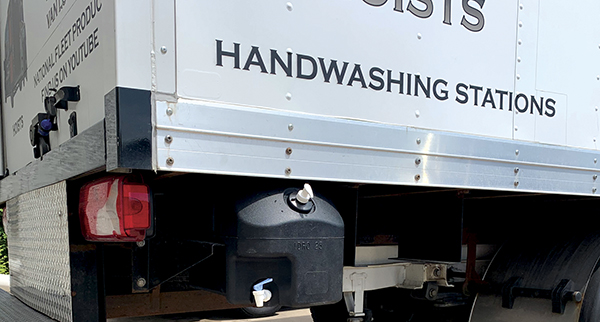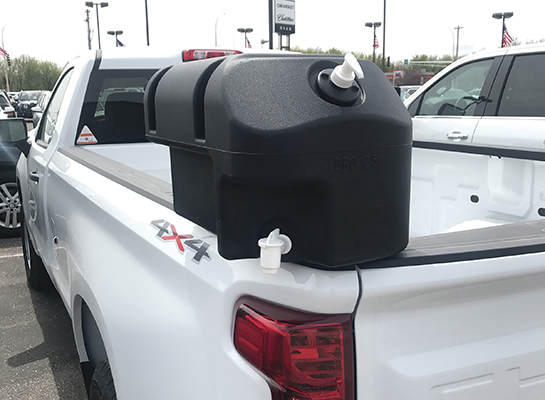We’re all in this together. How often have we heard this refrain over the last few months? The implication is that we all should look out for one another. But for essential workers and those now rejoining the workforce, the shortage of adequate personal protective equipment (PPE) has been a constant source of frustration.
For those working in remote locations away from modern plumbing, the problem can be exacerbated. Not only is PPE in short supply, but try finding hand sanitizer, sanitizing wipes, or even baby wipes these days.
The president’s Coronavirus Guidelines for America lists hand-washing first under its guidelines for practicing good hygiene. However until now, it has been difficult for vehicle operators, work crews, and others functioning in isolated conditions to observe what the Centers for Disease Control and Prevention (CDC) calls “one of the most important steps we can take to avoid getting sick and spreading germs to others.”
People working with their hands are advised to be cautious. Particularly those sharing tools, manipulating materials that others have been in contact with, or simply touching surfaces that have a good chance of potential contamination. Unfortunately, even though “we’re all in this together,” when we’re working away from civilization, or at least civilized plumbing, we’re kind of on our own.
CLEAN UP OUR ACT
Business owners and managers who have either continued to work through the pandemic or are just now putting their folks back in the field have to think long and hard about how they will protect workers from the virus and from contaminating each other. Regular hand-washing in the field has been one of the hardest regimens to adhere to, even for the most ardent supporter of hygiene compliance.
National Fleet Products just announced the introduction of new portable and vehicle-mounted hand-washing stations. The rugged, purpose-built product design allows water and hand sanitizer to be dispensed virtually anywhere, and application-specific hardware enables units to stand on their own or to be mounted to a wide variety of vehicles.
“Our versatile mobile hygiene station will be a game changer, making hand-washing more accessible and convenient and helping to reduce the spread of COVID-19,” Steven Peterson, president of National Fleet Products, says. “These cleansing stations are totally versatile and will now enable all sorts of businesses to protect their workers and their customers from transmitting disease.”
These days, organizations accepting cargo may be wary of those manning vehicles. They don’t know what hygiene methods are observed by operators and crews and may be generally concerned.
“We’ve installed National Fleet Products’ vehicle-mounted hand-washing stations on two of our work trucks,” says Mark Barfield, president of Houston-based Expedite!, Inc. “Using the hand-washing stations when we arrive for a delivery shows our customers that we care about their safety and our workers’ health, and it also demonstrates that we’re organized and have our own protocols in place.”
Barfield noted that many of his customers have made positive comments about the hand-washing stations. “I’ve had lots of appreciative comments about the hand-washing measures we’re taking and about the professionalism it projects about our business and the way we run our fleet.”
WASHING STATION

The black or translucent white water-dispensing tanks come in 6.5 gallon and 10 gallon sizes and are made of durable, virgin polypropylene with an additive that makes them resistant to UV rays. An integrated removable soap dispenser serves as the cap to the filling port. A separate cap is also available for those who want to provide other forms of soap or cleansing agents.
“These units are extremely rugged, easy to clean, and built to last,” Peterson says. “They can survive quite successfully on the outside of a vehicle, on a worksite, and in just about any environment you throw at them.”
Spring-toggle water spigots are easy to operate, and because they automatically stop water flow when no longer depressed, they eliminate recontamination because there is no need to touch them again once hands are clean. The spigots are recessed and side mounted to protect them from damage.
“We wanted to minimize the need to touch the unit after washing,” Peterson says. “The spigots also reduce water usage and the potential for waste due to someone leaving the water on during washing or forgetting to turn the water off after finishing.”
RIGHT PLACE RIGHT TIME
Portable units are available with sturdy, powder-coated steel frame stands that can be outfitted with additional accessories such as paper towel dispensers, graphic signage, and more.
“Positive guidance signage that reminds people to wash hands frequently can easily be applied to the frames,” Peterson says. “The tanks can also accommodate special decal material and other customization of accessories can be explored on an individual basis.”
Vehicle-mounted units are available with frame- and body-mounting hardware that is compatible with virtually any type of truck, including heavy-, medium- and light-duty pickups, work trucks, box vans, ag and construction equipment, trailers, and more.
“Mounting the hand-washing stations on our vehicles was fast and easy,” Barfield says. “Everything we needed was in the kit from National Fleet Products.”
Now workers who share tools and equipment can regularly clean their hands to reduce cross contamination with colleagues. The new units meet OSHA requirements for hand-washing stations at construction sites and can easily be positioned and repositioned as the need arises.
KEEP IT CLEAN
The vehicle-mounted hygiene station enables drivers and crews to sanitize their hands before reentering the vehicle. The system also allows workers and others to avoid unnecessary exposure to hand-washing fixtures in public restrooms, often recognized as key vectors for disease exposure and transmission.
“My drivers and crews are thrilled to be able to wash their hands right after fueling their vehicles and without having to enter the gas station or interact with others,” Barfield says. “We have exterior truck-mounted toolboxes as well and keep them stocked with paper towels for hand drying after washing.”

Most fleets are attached to physical facilities of some type, and the vehicles are simply and extension of the way that facility is run. Not only can the portable and vehicle-mounted hand-washing stations augment sanitation around a physical plant, it allows the fleet to show workers that good hygiene habits don’t stop when they drive off the lot.
“I had one municipal solid waste fleet tell me that they are excited to have such a versatile sanitizing solution because they want to keep their people working, but they want to keep them safe in the process,” Peterson says. “Our new portable and vehicle-mounted hand-washing stations help establish new behaviors and reinforce better, more health-conscious habits.
“Responding to the new normal is something we all face, so we really are all in it together,” Peterson continues. “With our new portable and vehicle-mounted hand-washing stations, we hope to give individuals, businesses, and municipalities the freedom to stay mobile while also staying safe.”
National Fleet Products’ new portable hand-washing stations can be located at warehouse shipping and receiving doorways, at manufacturing and commercial building points of entry, near fixed and portable restroom facilities, adjacent to food production stands, on construction project sites, and at agriculture production and processing facilities. The vehicle-mounted hand-washing stations can go anywhere the vehicle goes.
FOR MORE INFORMATION
Find out more, visit www.nationalfleetproducts.com.




